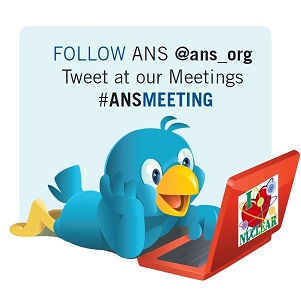Communications Sessions start June 16 at 2014 ANS Annual Meeting
One of the many highlights at American Nuclear Society national meetings is the opportunity to hear terrific communicators sharing their insights and best practices, along with lively and informative panel discussions that follow. The June 2014 ANS Annual Meeting offers three of these popular sessions-if you will be in Reno, Nev., be sure to schedule them on your meeting calendar.
Communicating with Communities: Panel discussion with Chip Cameron, John Kotek, and Nicole Stricker. Monday, June 16, 1 p.m. in Carson 1
Both community and policy-maker support are critical for successfully siting and operating nuclear facilities. In back-to-back sessions, panelists will explore the strategies and tactics that work, along with those that don't, in building support for nuclear facilities and operations. They also will discuss the specific challenges they face as well as the actions they are taking to reach out to and educate policy makers on the benefits of nuclear energy facilities.
The panelists: Chip Cameron, former US Nuclear Regulatory Commission assistant general counsel and an expert on outreach, conflict resolution and the National Environmental Policy Act (NEPA), is going to kick off our discussion with a brief presentation that will set the table for both sessions. His background and his work as a public meeting facilitator provide him with a unique perspective on the interplay between legal constructs and "real" communication. He's going to talk about how communication with communities and policy makers has been affected over the past 40 years by the public participation requirements in NEPA law. He will describe how legal requirements can offer formal and often underutilized tools for communication.
From there, he'll be joined by Nicole Stricker and John Kotek, who will have some lively experiences from Idaho National Lab (INL) and the Blue Ribbon Commission on America's Nuclear Future, respectively, to bring the discussion to life. Nicole is the senior science writer and nuclear communications lead at INL with substantial experience in communicating with communities, social media, media outreach, and science communications. Before joining INL, Nicole was a journalist covering science in Idaho. John is a partner in Gallatin Group. He served as staff director of the Blue Ribbon Commission on America's Nuclear Future that recommended a path forward for nuclear waste disposition. Previously he was deputy manager for the US Department of Energy's Idaho Operations Office. He also served as a Congressional Fellow in Sen. Jeff Bingaman's office (D., New Mexico).
Building Policy-Maker Support for Nuclear Facilities: Panel discussion adds Harsh Desai and Craig Piercy. Monday, June 16, 2:30 p.m. in Carson 1
Our community-communications focus will set the context for more political examples after the break at 2:30 pm. The discussion will focus on what it takes to build policy-maker support for nuclear facilities, how communities play a critical role, and what formal and informal communication looks like from both points of view. AAAS/ANS Congressional Fellow Harsh Desai and ANS Washington Representative Craig Piercy will provide their perspectives on the politics of siting and what it takes to educate policy makers so it can be successful. Harsh Desai is working in Sen. Diane Feinstein's office (D., Cal.) during his fellowship, where he focuses on science, nuclear, and energy policy. Craig Piercy develops and carries out ANS's federal outreach on Capitol Hill and with the Executive Branch on behalf of the 11,000 men and women of ANS. Craig heads the Washington Office of Bose Public Affairs.
Focus on Communications Workshop: What Will It Take to Move Nuclear Energy Forward? Sponsored by the ANS Center for Nuclear Science and Technology Information, Wednesday, June 18, 4:00 - 5:30 p.m. in Rooms N-3 and N-4
Our nuclear community has plenty of issues to address. Some nuclear plants are closing or under threat either because of economics, equipment, implacable opposition from activists, or a combination of these factors. Nuclear science budgets are smaller and smaller due to federal budget cuts. Sanctions or pending sanctions on Russia are negatively affecting joint research projects between U.S. universities and Russian researchers, placing some of them in stasis. And export restrictions (and in some cases, bureaucracy) may compromise the ability of U.S. companies to compete and win in international tender offers, and compromises our seat at the table in international nonproliferation regimes. This workshop will address the role that ANS members can play in addressing these issues, including messaging and outreach approaches that will be compelling and effective. Join ANS Washington Representative Craig Piercy and ANS Distinguished Service Award recipient and Potomac Communications Group Managing Partner Mimi Limbach for a lively discussion and a focus on the actions that each of us can take. Beer, wine, and snacks will be served, courtesy of the ANS Center for Nuclear Science and Technology Information.




